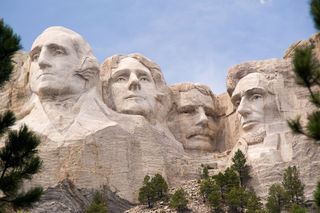Health
Study: Half of All Presidents Suffered From Mental Illness
Research to consider when evaluating this year's field of candidates.
Posted February 2, 2016 Reviewed by Ekua Hagan

After reading a variety of articles about whether Donald Trump has narcissistic personality disorder (e.g., in Vanity Fair as well as Psychology Today), I became curious about whether having a mental illness would put the kibosh on a candidate's chances of getting elected. So I did some research and the answer is quite clear—not so much.
According to a study by Jonathan Davidson of the Duke University Medical Center and colleagues, who reviewed biographical sources for the first 37 presidents (1776-1974), half of those men had been afflicted by mental illness—and 27% met those criteria while in office, something that could have clearly affected their ability to perform their jobs.
The authors of the study concluded that 24% percent of presidents met the diagnostic criteria for depression, including James Madison, John Quincy Adams, Franklin Pierce, Abraham Lincoln, and Calvin Coolidge. (Depression seemed to ease for the group about a century ago, coincidently, around the time electricity and indoor plumbing swept the nation. I’m not saying the two are connected but I have my suspicions.)
Davidson and his team also found evidence of anxiety disorders, ranging from social phobia to generalized anxiety disorder, among 8% of the presidents, including Thomas Jefferson, Ulysses S. Grant, Coolidge, and Woodrow Wilson.
More seriously, the team concluded that 8% of presidents had signs of bipolar disorder, Lyndon Johnson and Theodore Roosevelt among them. Indeed, Theodore Roosevelt’s decision to go on a two-year expedition of unexplored areas of the Amazon smacks of manic thinking. (Only 16 of the 19 expedition members survived the ordeal.)
Finally, 8% of the presidents studied exhibited evidence of alcohol abuse or dependence. Pierce died of cirrhosis of the liver; Grant was once allegedly so drunk he fell off his horse during a military parade in New Orleans, and Nixon was once unable to take a rather important phone call from the British Prime Minister because he was “loaded."
Numerous other presidents had physical conditions that can have a severe impact on psychological functioning. Taft, for example, had sleep apnea, which is associated with declines in cognitive functioning across the board, and most famously, some scholars now believe that Ronald Reagan showed early signs of Alzheimer’s while still in office.
These assessments cast the question of whether Donald Trump may have narcissistic personality disorder in a different light. First, let’s acknowledge that believing one is qualified to be the leader of the free world requires a certain dollop of narcissism to begin with. Second, the issue is not just whether these traits cross into pathological territory but whether a person’s mental health and potentially pathological personality characteristics necessarily mean they are unfit for office.
Reviewing the list above, we consider many of the presidents on it among the finest in our history. Indeed, Dr. Nassir Ghaemi, who runs the Mood Disorders Program at Tufts Medical Center in Boston, argues in his book, A First Rate Madness: Uncovering the Links between Leadership and Mental Illness, that leaders with some mental illnesses can actually perform well in times of crisis as they may be more prepared to deal with upheaval and uncertainty.
Even if one were to accept Ghaemi’s assertion, we've also witnessed what can happen when a leader’s mental health is compromised. Consider Nero's behavior during the burning of Rome or that of any number of 20th-century despots.
Alas, while we ask candidates for the presidency to disclose their medical histories, we have no mechanism to evaluate their past and present mental health. Should we?
Do you think the mental health of potential presidential candidates is important? Weigh in by commenting on this post.
For tips on overcoming regular psychological problems of the sort we (and every presidential candidate) experience, check out Emotional First Aid: Healing Rejection, Guilt, Failure, and Other Everyday Hurts.
Copyright 2016 Guy Winch




